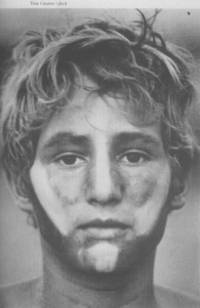Even though I've already read this book two summers ago, I am excited to study the book with the whole class and discuss the underlying themes, something that readers don't usually do while individually reading a book. So far in the book, we have been introduced to a group of young school boys, stranded on an island after a plane crash.
Pictured above is the island, with the different places labeled according to the boys' view. So far in the novel, the boys have identified the scar.
Our essay prompt on LOFT is based on Golding's characterization throughout the novel, which is seen and noted in the very beginning sentences of chapter one. The first main character introduced is Ralph, described as a twelve year old boy, golden-bodied, well-built, mild-mouthed, with eyes that speak no devil. Right away, readers have a vision of a strong, mature, handsome adolescent. Golding characterizes Ralph, portraying the boy as non-chalant, relaxed, and self-assured.
The second character introduced to the novel is that of "Piggy". Piggy contrasts with Ralph, being described as short and fat, adorned with thick spectacles. Golding illustrates Piggy's character through his nervous, worried, almost insecure state of being.
Already in the first half of the first chapter, readers can predict conflicts arising from the differing personalities and individuality of the characters Piggy and Ralph. When Piggy tells Ralph that the kids at school called him Piggy and he expressed his dismay over it, Ralph immediately broke into laughter, showing no compassion for Piggy and his insecurities. Piggy also seems to be extremely compliant and almost desperate for attention, especially Ralph's attention, perhaps setting up a conflict in which Ralph coerces Piggy by utilizing the weak nature of his character for Ralph's own benefit.
Later in the chapter, Piggy and Ralph find a conch, and use it to summon the rest of the boys on the island.
Jack seems to be angry, agitated, and somewhat dogmatic when he speaks. His dominance is noted, through the jaundiced way he speaks to the choir boys and talks to Ralph in a demanding tone. As the boys vote Ralph to be chief of the island, Jack is angered, showing his desire for leadership. Once again, a clear conflict can be inferred at this point in the novel between Jack and Ralph. Both desiring chiefdom and power, an obvious problem will arise between Ralph, the current leader, and Jack, the one who desires chiefdom and power the most. Perhaps Jack will become an anathema to Ralph, or vice versa.
Another character is also introduced; one of the boys in Jack's choir group. Another main character is born in Simon, small, skinny, with coarse hair.
Simon seems to be shy, and throughout the novel, his character may be the one which develops the most.
Looking back on the possible conflict between Piggy and Ralph, it's easy for me to make a connection with their relationship to the friendships I witness at school. I know many pairs of friends where one person is clearly dominant, whereas the other person is more of a follower, desperate for acceptance and willing to go to extreme measures to be accepted. This kind of relationship can be toxic, and when someone is taken advantage of, they may suffer extreme ignominy and in the end, tragic results could ensue.
Another issue prevalent in the world today is that of bullying, seen through the castigation of Piggy by the other boys on the island. Piggy is ostracized because of his weight, obvious through the name of Piggy, and young boys don't seem to realize the effects of laughing at Piggy may have on him. I observe situations like this almost every day at school. I hear people making fun of somebody, perhaps not realizing the effects it may have, or not realizing that what they're doing is called bullying.
In this news report, the facts show that 1/3 of teens are bullied in schools, demonstrating just how gauche kids are today, not even realizing what careless banter can escalate to.





